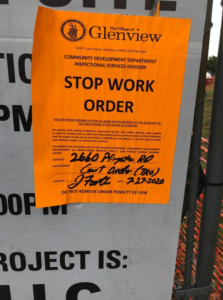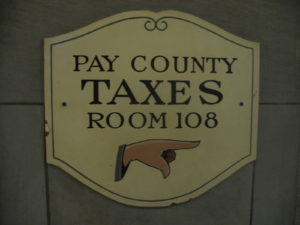
Justice Denied by Illinois Supreme Court on Excessive Condo Act Fees
The Illinois Supreme Court just released its highly anticipated opinion in Channon v. Westward Management, 2022 IL 128040 (November 28, 2022). The case examined a single question: “Whether section 22.1 of the Condominium Property Act provides an implied cause of action in favor of a condominium unit seller against a property manager, as agent of a condominium association or board of directors, based on allegations that the property manager charged excessive fees for the production of information required to be disclosed to a prospective buyer under that statute.”
The Appellate Court had found a private right of action exists against a management company charging Sellers excessive fees to obtain the required 22.1 disclosures, and Westward Management Company appealed. Both courts applied the four-part test for determining whether a statute creates a private right of action by implication that was set forth in Metzger v. DaRosa, 209 Ill. 2d 30, 36 (2004). The Metzger test examines whether (1) the plaintiffs are members of the class the statute was intended to benefit, (2) the statute was designed to prevent the plaintiffs from suffering the injury they incurred, (3) the statute’s purpose is consistent with the creation of a private right of action, and (4) it is necessary to imply a private right of action to provide an adequate remedy for the statutory violation.
The Supreme Court found the plaintiffs’ claims did not satisfy the first prong of the test because, it said, sellers are not the primary intended beneficiary under section 22.1 – rather, the law is intended primarily to protect buyers of condominium units by providing them full disclosure. While this reasoning certainly applies to subsections (a) and (b) of the Act (covering what must be produced to buyers and a 30-day window in which to product it), the Supreme Court engaged in what can only be described as outcome-based judicial reasoning in dealing with the very inconvenient fact that subsection (c) shows that sellers were primarily intended to benefit from its provisions that associations (and their assigned agents) may only charge “a reasonable fee for covering the direct out-of-pocket cost of providing such information and copying.” Anyone who has sold a condo knows that associations and their management companies use the required 22.1 disclosures to make obscene profits from sellers who have no choice but to pay.
So how did the Supreme Court get around this inconvenient fact to achieve the outcome it clearly wanted? Did they engage in a lengthy, well supported examination of the statute’s language? Hardly. The entire “judicial reasoning” by Illinois’ highest court came down to one line of the weakest legal reasoning seen in recent memory:
Although the [Plaintiffs] maintain that this limit is plainly intended to benefit sellers by making the requisite documents more affordable for them to obtain, that language can just as readily be viewed as aiding potential buyers by ensuring that information critical to their purchasing decisions is readily available.
Come again? A provision limiting the charge an association can assess for documents the seller is required to provide is actually intended to aid potential buyers (who have to pay nothing for the documents) by ensuring the information is “readily available”? Exactly how a provision so clearly intended to ensure associations aren’t financially raping sellers makes documents “readily available” the court – unsurprisingly – does not address because it cannot actually defend such a vapid statement.
This is the kind of judicial “reasoning” that leaves the public (and decent lawyers) questioning the validity of our current judicial system. If courts can simply gloss over inconvenient facts on their way to achieving a predetermined outcome, we do not have justice, we have judicial fiat. That this decision was unanimous is truly disappointing.
This is a wake up call for our legislature to immediately amend the Condominium Act to provide such a private right of action against any party charging excessive fees to provide any documents required under the Act, not just under section 22.1.
North Shore Property Law was not involved in this litigation.

How to Protect Your Home from Squatters
We’ve all heard the horror stories. A family goes on vacation or is renovating their home only to find unknown and uninvited people living in their home. But thanks to overly liberal “tenant” protection laws, the homeowner’s nightmare is just beginning. These squatters often claim to have rented the property from someone claiming to be the owner, but usually can’t produce a lease or proof of payments. If that’s the case, it’s likely you are talking to the scammer directly, not some innocent party who might also be a victim. Either way, the police probably will not remove the squatters for fear of their own civil liability. They are likely to tell you to “take them to eviction court,” as if doing so is a cheap or fast process. Spoiler alert: it’s not.
So how can you protect your home if you’ll be away from it for any extended period of time? Aside from maybe full-time security, there are no foolproof methods, but the following list should help stop squatters in their tracks:
- Install security cameras inside and outside the home that alert you when motion is detected. If someone tries to break in or change the locks, you can alert police while the crime is in progress and provide the video evidence.
- Get a home alarm that will call the police in the event of intruders. Even if someone impersonates you and signs a lease with some scammer, no one will be able to disarm the alarm but you, which will be further evidence that the impersonator is not the rightful owner or tenant.
- Always change the locks on any home you purchase; make sure all locks work well and reinforce all entry points.
- Get to know your neighbors! Tell them when you’ll be out of town and that you are NOT renting or selling your house. Tell them they’ll be the first to know if you decide to rent or sell, and that anyone else they see trying to enter your home is an intruder.
- Lobby your state legislator to enact anti-squatter legislation. Vote out those who won’t.

North Shore Property Law Obtains Injunction Against Glenview
Permits Issued for Demolition, Tree Removal, and Construction at the Hart Property are Temporarily Invalidated and Suspended
North Shore Property Law announces that it has obtained a Temporary Restraining Order prohibiting the Village of Glenview from permitting further construction and demolition at the Hart Property at Willow in Pfingsten Roads. Read more on the Appellate Court’s ruling here. (more…)

Consider 3 ways our attorneys add value to your property tax appeal
We are very fortunate that the property tax appeals clients we work with are bright and accomplished people in the fields of law, tax and finance. Because of their experience and credentials, they once thought that they could prepare and file their own property tax appeals on their home and get the same results as if they hired us.
After experiencing frustration and disappointment with the results they got on their own, they turn to us to appeal their property tax assessment – with much better results. (more…)

Our record reflects success lowering property taxes on the North Shore
The deadline to file 2018 Cook County property tax appeals is at the end of August. With the days counting down quickly, we continue to receive calls from homeowners and realtors who want us to file appeals for them.
The table that follows presents a brief case study of just a few of the great results that North Shore Property Law achieved on residential properties in 2017. (more…)

Two strategies to successfully appeal property taxes on a condominium
The benefits of a successful property tax appeal are indisputable – for single family home owners and condo owners alike. For a single family home, a successful appeal can reduce your tax bill by thousands of dollars a year. It also makes your property more appealing to potential buyers when the time comes to sell in a competitive real estate market.
Condo owners can also benefit from a property tax appeal. (more…)

North Shore Property Law celebrates National Homeownership Month
June is National Homeownership Month, a time to celebrate and advocate the American Dream of owning a home. Homeownership is a great way for Americans to build wealth, support the national and local economies and create stable communities.
We also recognize that your home is your greatest asset.

Attorney Brendan Appel named Leading Lawyer in Illinois
Attorney Brendan R. Appel, a founding partner at North Shore Property Law, has been recognized as a Leading Lawyer in the areas of Residential Real Estate Law, Commercial Real Estate Law, and Association and Condominium Real Estate Law. This recognition is earned by fewer than 5 percent of all lawyers licensed to practice in Illinois. (more…)

Stand out from the crowd in this buyers’ market
Research done by the National Association of Realtors revealed that the spring housing market was among the most competitive in recent years. Demand is strong, but buyers are taking their time to find a home that checks all the boxes on their shopping lists. It’s definitely a buyers’ market. (more…)

Home buyers need a strong team supporting them
In its report on market trends, realtor.com reported that an increasing number of renters will act to buy property this year. Increases in the rent is the primary reason for renters to become buyers. (more…)

3 Secrets to a successful house flip
House flipping can be a great source of income – if you plan ahead. Consider our three secrets to a successful flip.
House flipping – the act of selling a house within a year of buying it – is at an 11-year high in the United States; a slew of popular television shows make it look easy and lucrative. (more…)

Cook County changes the way inherited property is transferred to a new owner
A warning to anyone who has recently inherited property: contact your attorney today. A recent change by the Cook County government will delay the time it takes to transfer ownership from the deceased to his or her heirs. And can significantly increase costs.

Seven ways to make your home sale quick and painless
If you see yourself entering the real estate market soon, consider how you can make your property stand out to potential buyers. (more…)

Property tax appeals lower your tax bill
Recent news reports have detailed the negative affect of property taxes on home sales. Homes are undervalued or not selling because of the high tax bills attached to the property.
At North Shore Property Law, we’ve seen how property tax increases are affecting the North Shore dramatically. The median increase on the value of a residential property in New Trier Township following the 2016 reassessment by Cook County was 25 percent.
Appealing your property taxes is a simple way to reverse that trend; a successful property tax appeal can knock thousands of dollars off a homeowner’s annual tax bill. (more…)
Tips for the Real Estate Buyer
Whether you are repeat or first-time home buyer, here are some tips to make the process easier:
Tips for the Real Estate Seller
Whether you are a seasoned property seller or completely new to selling, these tips should help you navigate the process and make selling your property as smooth and easy as possible.

